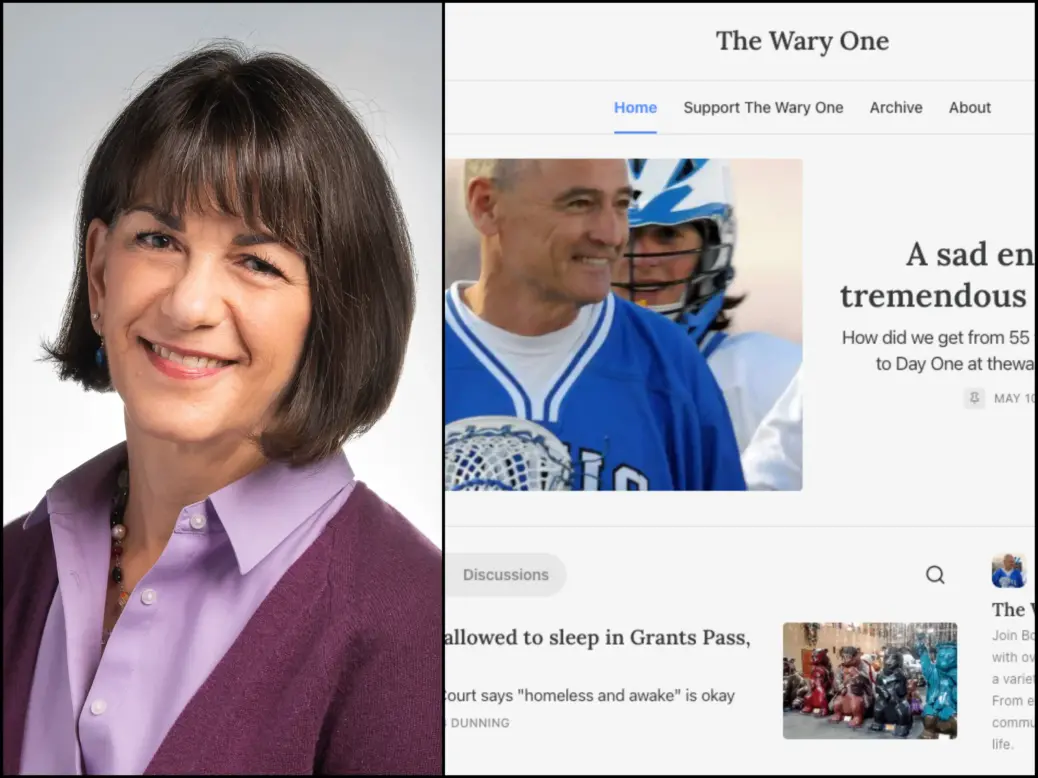
Two veteran local newspaper journalists who left their title amid cost cuts in May are already making more money after launching their own newsletters on Substack.
Bob Dunning and Wendy Weitzel had been at The Davis Enterprise in California since 1970 and 1998 respectively. Both started newsletters on Substack in May and each now boasts more than 1,000 paying subscribers.
Dunning, who had contributed five columns a week to the now twice-weekly paper for 54 years, was laid off in May without explanation or severance. The move prompted Weitzel, who wrote a column about local businesses for the paper named Comings and Goings, to quit in solidarity.
The pair started their Substack newsletters almost immediately: Dunning’s is titled “The Wary One” and Weitzel’s has kept its previous name.
Dunning said he had been paid $26 an hour for his 40 hours of work a week at the Enterprise, amounting to a little over $54,000 a year. A month and a half on, his annualised salary now stands at approximately $92,000 before the 10% cut taken by Substack.
Around $14,000 of that figure comes from the 40 or so people who paid $350 to be “founding members”. On top of those, Dunning said around 80% of his subscribers paid a $70 annual fee upfront rather than the monthly $7 option, meaning “what has actually come directly into my bank account is around $70,000 at this point”.
“It’s stunning,” he said. “I’m afraid to touch it because I don’t think it’s real. It’s like, that’s not real money, that’s crypto!”
Weitzel said she felt “more rewarded for what I’m doing” by the new set-up. Unlike Dunning, who got his first job in news by walking into the Enterprise office and asking for one, Weitzel holds a journalism degree and spent a decade as the paper’s managing editor.
By the time she left in May she was a freelance contributor paid “a couple of hundred dollars for each column” and making the rest of her income from public relations work.
But now, she says, “I have more motivation to spend a little extra time” on the column, which has kept its local business focus.
Columnists leave local paper for Substack, say employer made ‘a fatal mistake’
Dunning told Press Gazette he has “around 4,200 subscribers”, of whom around 1,100 pay. Weitzel said her figures look approximately the same, giving her Substack revenue of around $50,000 per year.
The pair said they are often told they were the reasons their readers subscribed to The Davis Enterprise, and Dunning speculated that each of the pair’s total subscriber lists were now larger than the Enterprise’s circulation, adding that “my paper carrier said he hasn’t gotten a new subscription in a couple of years, and he’s down 30, 40% in terms of the papers he’s tossing”.
The Enterprise’s publisher, McNaughton Media, did not return a request for comment, but in an awards submission last year the paper entered itself into a category reserved for weekly newspapers with circulations of between 4,301 and 11,000.
The pair said their subscriber success may be due to the fact they already had strong followings.
“I have almost 6,000 followers on Facebook for my Comings and Goings column,” Weitzel said. “Bob had just a loyal following who read the hard copy of the paper. They were going to follow us wherever we were, and after [Dunning was let go], it really created a momentum of people who were just mad at the paper.
“It was cheaper to buy our subscriptions than it was to buy the paper, and so it was kind of a no-brainer for a lot of them.”
Despite the pair’s suspicion that they have cut into the Enterprise’s subscriber figures, Dunning said he didn’t feel he was competing with his former colleagues, saying “there’s some people that still do both subscribe to me and Wendy and still take the paper”.
But he was blunt about the commercial impact he thought letting him go would have.
“I think, honestly, it was a fatal, fatal mistake… It stuns me that they made the decision. It was a bad decision, not just for me personally, but a bad decision for the paper.”
Email pged@pressgazette.co.uk to point out mistakes, provide story tips or send in a letter for publication on our "Letters Page" blog
